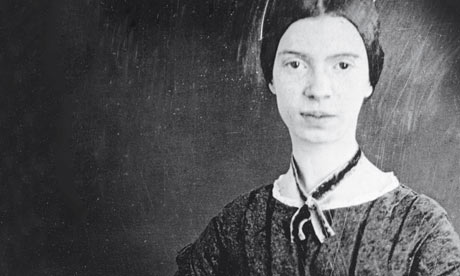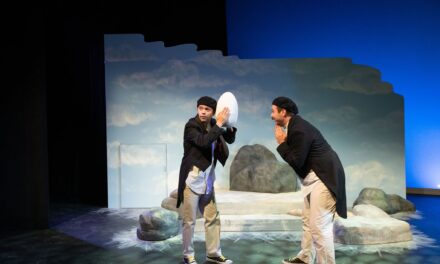Emily Dickinson
Emily, an original chamber opera
By Eva Kendrick
Directed by Julane Havens
Conductor Katy Vaitkevicius
Review by Keith Waits
Entire contents copyright © 2014 by Keith Waits. All rights reserved.
Opera is big, perhaps even grandiose. Except when it is not. The adjective “operatic” depends upon that perception of larger-than-life melodrama, and is not appropriate to Emily, which makes virtue out of understatement and low-key, even ordinary moments in the life of poet Emily Dickinson.
The action, if you can call it that, turns on one particular poem, If you were coming in the fall, and the manner in which it is misunderstood by family and friends close to Dickinson. We learn about her brother Austin’s troubled marriage and infidelity, the disapproval of her father Edward, and her devotion to The Reverand, a character based on Charles Wadsworth, a figure of no small influence in her life.
There is a concentration on relationships, establishing the context of Dickinson’s worldview, and how significantly she moved against the grain that make for a fascinating and intimate narrative with little of the melodrama one might expect from opera. A one-act structure clocking in at one hour seemed over too soon partly because a deliberate embrace of anti-climax. This is an insightful glimpse into the psyche of a budding but reclusive artist whose life simply does not provide the building blocks of standard dramatic structure. There is no tragedy to exploit other than the pathos one might draw from a conflicted soul, but that introspection is what makes Emily a singular theatrical opera.
I would not deign to be critical of vocal performance, which seemed exemplary. If it seemed that the women’s voices dominate, it was at least thematically consistent and never threw things out of balance. Kristina Bachrach was a striking and forceful Emily, while Lisa Perry had significant impact as Mabel Loomis Todd, Austin’s mistress. I was also rather taken by Haley DeWitt’s charming supporting turn as younger sister Lavinia. Among the men, Preston Orr’s Austin was narratively the most important and most developed character, and he did quite well by it. But, in truth, there was not a false note among any in this accomplished ensemble.
Dramatically, the high points occur in two successive scenes involving multiple characters. A challenging sextet of family and one hapless prospective suitor for Emily provides the most complex moment dramatically and musically, as a conversation shifts into six separate interior monologues. Immediately following is a scene of the family at the dinner table that features the most sublime example of harmony as one Emily joins the sextet for a rendering of The Lord’s Prayer.
Director Julane Havens paces the production so that the ending arrives unexpectedly, and hardly seems a full hour in length. Of course, the determinedly anti-climactic finish also serves to undermine our expectations, and the libretto maintains admirable fealty to the facts of Dickinson’s life.
Emily is the first of three Thompson Street productions on successive weekends. Next week will bring a double bill of Rootabaga Stories and Requiem for the Living (May 30-June1) followed by Ile, (June 6-8). All three productions are at Vault 1031.
Emily, an original chamber opera
May 23, 24, 25, 2014
Thompson Street Opera Company
At Vault 1031
1031 South Sixth Street
Louisville, KY 40202
Thompsonstreetopera.org
vault1031.org





